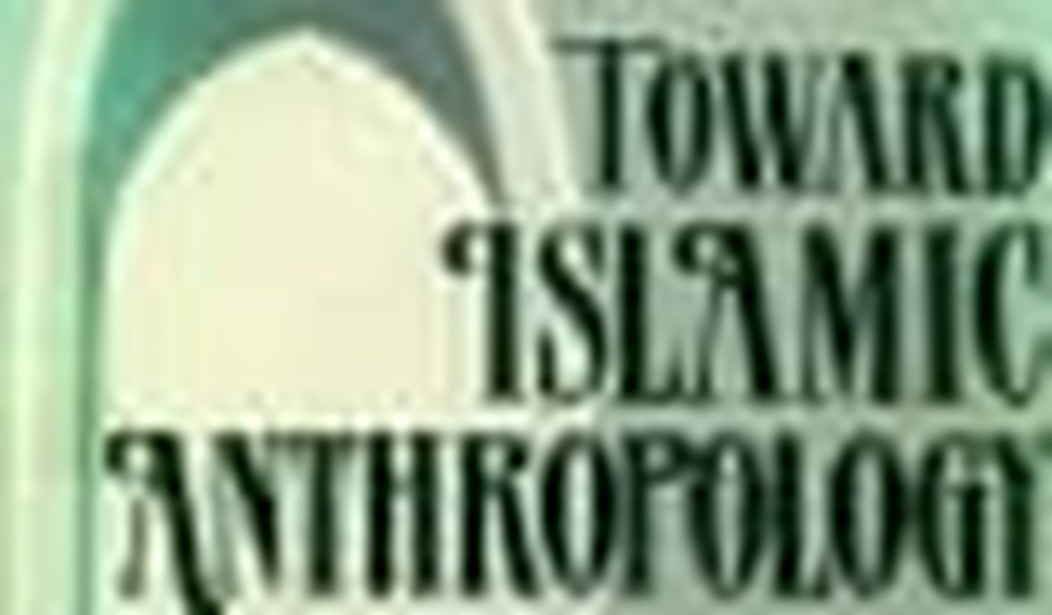Last fall, Professor Akbar Ahmed, Ibn Khaldun chair of Islamic studies at American University, appeared on media outlets including The Daily Show and CNN and said America’s Founding Fathers admired Islam. I disproved this view in a detailed, heavily documented article. Widely linked, the article garnered a response written by Prof. Ahmed’s research fellow, Frankie Martin, which appeared in the Washington Post last November.
Martin used so much ad hominem and invective in his article — directed towards me — that Daniel Pipes’ Campus Watch wrote that Martin’s piece was an “intemperate — one might even say hateful — attack.”
Ad hominem and invective are frequently used as an attack on civil debate so as to divert discussion away from the facts. So Mr. Martin, I have some more facts.
Professor Akbar Ahmed’s own CV and bio conceal his work with a global Islamist movement known as the Islamization of knowledge. The movement maintains international seminars, conferences, and summer student programs. These events are organized by the International Institute of Islamic Thought (IIIT), which was founded in 1980 and has headquarters in the United States and satellite offices in the United Kingdom, France, Saudi Arabia, Bangladesh, Egypt, India, Indonesia, Jordan, Lebanon, Morocco, Nigeria, and Pakistan.
Islamization of knowledge is defined by its proponents as follows:
Islamization of knowledge simply refers to an attempt through which those aspects of the body and purpose of knowledge and of the process and methodologies of discovering, validating, imparting and applying it, which oppose Islam, are identified and made subservient to the Islamic worldview. [Italics in original]
The Islamization of knowledge movement seeks to ensure that anything taught in the university classroom which “opposes Islam” must be discarded. An extreme example is found in Ahmed’s erroneous statements that the Founding Fathers admired Islam. This was an attempt to “Islamize” Americans’ “knowledge” of the origin of their nation.
The Islamization of knowledge is a global movement that was begun in the 1970s by members of the Muslim Brotherhood. In a 1991 memorandum — “On the General Strategic Goal for the Group in North America” — the Muslim Brotherhood itself described its own goals as follows:
The process of settlement is a “Civilization-Jihadist process” with all that the word means. The Ikhwan [Muslim Brotherhood] must understand that their work in America is a kind of grand Jihad in eliminating and destroying the Western civilization from within and “sabotaging” its miserable house by their hands and the hands of the believers so that it is eliminated and God’s religion is made victorious over all other religions.
According to counterterrorism expert Dr. Terri K. Wonder of Henley-Putnam University:
The Islamization of knowledge is part of the Muslim Brotherhood’s “strategic vision … under [which] a minority Muslim group infiltrates through legitimate legal processes a majority’s secular institutions, starting with its universities. Over time, “Islamized” Muslim and non-Muslim graduates of universities enter the workforce, including a nation’s civil service sectors. From there, arguably, those “Islamized” graduates are poised to subvert a host society’s law enforcement branches, intelligence community, military branches, and foreign services.”
…
When the [International Muslim Brotherhood] has determined that institutions in a host society have been weakened sufficiently “from below” through its “Islamization” reform program, it leaves its phase of “concealment” (kitman) and enters into direct action, which could be anything from a leadership coup in a mosque, to the takeover of a police station, to a government coup d’etat.
Ahmed’s American University CV and his current American University bio , AU Faculty, and U.S. Army profile pages omit his 30-year association with the Islamization of knowledge movement.
The same Muslim Brotherhood document cited above lists several groups as “our organizations and the organizations of our friends.” Among those listed are the International Institute of Islamic Thought (IIIT), the Association of Muslim Social Scientists (AMSS), and the Islamic Institute of Advanced Studies (IIAS). All three organizations are part of a network known as the SAFA Group, which the federal government raided in March of 2002 on suspicion of providing material support to terrorists, money laundering, tax evasion, and ties to the Muslim Brotherhood.
One of the originators of the Islamization of knowledge, and a founding member of IIIT, is American Professor Isma’il al-Faruqi. In 1983, al-Faruqi declared his objective was to see America eventually under the banner of Islam:
Nothing could be greater than this youthful, vigorous, and rich continent [of North America] turning away from its past evil and marching forward under the banner of Allahu Akbar [God is great].
Per Ismail Faruqi Online, al-Faruqi advocated a “radical Islamization of new knowledge.” According to al-Faruqi’s Islamization of Knowledge: General Principles and Work Plan, (IIIT 1987):
The great task … is to recast the whole legacy of human knowledge from the view point of Islam.… To recast knowledge in the mold of Islam relates to the Islamic vision. It is necessary to Islamize knowledge, i.e. to redefine and re-order the data, to rethink the reasoning and relate the data, to reevaluate the conclusions, to re-project the goals and to do so in such a way as to make the disciplines enrich the vision and serve the cause of Islam.
Note that al-Faruqi says that human knowledge should be “recasted,” not to serve the cause of truth or science, but “to serve the cause of Islam.”
The Islamization of knowledge movement applies its efforts to university textbooks and lectures, and to articles published in journals such as the American Journal of Islamic Social Scientists (AJISS). Ismail al-Faruqi wrote that “Islamizing knowledge [is] to Islamize the disciplines, or better, to produce university level textbooks recasting some twenty disciplines in accordance with the Islamic vision.”
Professor Akbar Ahmed is recognized as a leading authority in the Islamization of knowledge movement. At IIIT’s 3rd International Conference of Islamization of Knowledge in Malaysia in 1984, Ahmed presented a preliminary version of Toward Islamic Anthropology: Definitions, Dogma, and Directions, which was ultimately published by the IIIT in 1986. In an excerpt (on page 207) from a book Ahmed wrote in 1988, Discovering Islam: Making Sense of Muslim History and Society, Ahmed writes how he met al-Faruqi in 1980, the year in which al-Faruqi founded IIIT, and was encouraged by him to write about the Islamization of knowledge:
I first met [al-Faruqi] when I was invited to the Institute for Advanced Study at Princeton in 1980. At our first meeting his warmth, sense of humour and moral earnestness impressed me … he wishing to persuade me to join him in the “Islamization of Knowledge” by writing on Islamic anthropology for the Institute, I arguing that I was not yet equipped for it. … For the next few years our arguments would continue. In the end he prevailed. My book, Towards Islamic Anthropology, one of the first in the series, was published about the time of his death.
Al-Faruqi writes the foreword to Toward Islamic Anthropology. In it he praises Akbar Ahmed’s work as being “the first in a series” designed to “prepare that discipline for re-establishment on Islamic foundations”:
This [Akbar Ahmed’s book] is the first of a series of works which the International Institute of Islamic Thought presents to the reader in fulfillment of its program for the Islamization of the sciences. This program, conceived and crystallized in a number of symposia on the subject, consists of twelve steps designed to effect the necessary Islamization in the various disciplines of human knowledge. Some of these steps seek to survey and evaluate modern Western accomplishments. Others do the same for the legacy of Muslim learning. The purpose is to reach full mastery of the “state of the art” in each discipline, and to prepare that discipline for re-establishment on Islamic foundations.
During a 2001 event, IIIT co-founder and Muslim Brotherhood member Dr. Jamal Barzinji introduced Professor Ahmed as the “first to contribute to IIIT’s emphasis on ‘Islamization of Knowledge’” through Toward Islamic Anthropology.
The book continues to be listed on the IIIT website today as one of its publications. Yet this work is not mentioned in Ahmed’s American University website CV and bio. The omission is particularly glaring given that anthropology is the field in which Ahmed holds his doctorate.
Professor Ahmed’s CV notes that he has been a member of the Board of Trustees at the Graduate School of Islamic & Social Sciences (GSISS) since 2002. Ahmed fails to mention the fact that he was in fact a member of the faculty of this organization prior to 2002, when GSISS was known as the Islamic Institute of Advanced Studies, which was raided in 2002 for suspected terrorism financing, money laundering, tax evasion and ties to the Muslim Brotherhood.
Ahmed’s own words fourteen years earlier in Discovering Islam: Making Sense of Muslim History and Society explain how IIIT founder al-Faruqi placed Akbar’s name on the faculty of both the IIIT and the Islamic Institute of Advanced Studies:
He [al-Faruqi] called it the “Islamization of Knowledge.” This was his vision and it became his passion. Towards this end he helped set up the International Institute of Islamic Thought, and, recently, the Islamic Institute of Advanced Studies, both in the USA. (My name was placed on the faculty of the two Institutes thanks to him.)
Akbar Ahmed’s CV and bio do not mention that his name was on the faculty of this prominent institute.
Ahmed is also on the International Advisory Board of American Journal of Islamic Social Sciences (AJISS), a joint publication of the IIIT and the Association of Muslim Social Scientists (AMSS). Akbar Ahmed, through the School of International Service, cosponsored an AMSS conference at American University in 2002.
Ahmed has been collaborating with IIIT scholars as recently as last year. In 2010, Akbar Ahmed and IIIT scholar Tamara Sonn collaborated on a university textbook titled The Sage Handbook of Islamic Studies. Both Ahmed and Sonn have a seat on the International Advisory Board of the American Journal of Islamic Social Sciences. The Sage Handbook of Islamic Studies contains essays from a number of IIIT scholars and contributors.
The Sage Handbook of Islamic Studies is an example of how IIIT scholars quietly and surreptitiously disseminate Islamized knowledge in the university classroom around the globe. Akbar Ahmed and Tamara Sonn included IIIT scholar Lawrence Rosen, a long time colleague of Akbar Ahmed whose work includes Islam and Freedom of Thought which he co-wrote with Akbar Ahmed, and which is listed in the article collection on the Muslim Brotherhood website devoted to subjects including the Islamization of knowledge. Dietrich Reetz is another scholar included in the collection. Reetz collaborated with other Islamic scholars, including Akbar Ahmed, and wrote a 1995 article, Education: the Islamization of Knowledge, published at Oxford University. Other authors included in the anthology share a seat with Ahmed and Sonn on the International Advisory Board of the AJISS.
Islam and Freedom of Thought and Education: the Islamization of Knowledge are also not mentioned in Ahmed’s CV and bio.
Ahmed’s reputation as a “moderate” has earned him television interviews and federal advisory as an expert on Islam; but his CV and bio conceal his leadership role in the Islamization of knowledge and his associations with IIIT and the Muslim Brotherhood. It appears that Akbar Ahmed is no moderate.
Ahmed is currently Ibn Khaldun chair of the department of Islamic studies at American University. Ibn Khaldun was a 14th century Islamic philosopher and scholar, a man about whom Akbar Ahmed has written. Ibn Khaldun advocated violence against non-Muslims as a religious duty, in order to achieve the larger goal of dismantling non-Muslim civilization and imposing an Islamic caliphate. Ibn Khaldun made it clear that holy war is the duty of every Muslim. From his most famous work, Muqaddimah:
In the Muslim community, the holy war is a religious duty, because of the universalism of the [Muslim] mission and [the obligation to] convert everybody to Islam either by persuasion or by force.
Professor Ahmed’s inaccurate statements about America’s Founding Fathers and Islam exemplify how the Islamization of knowledge is being quietly and surreptitiously disseminated to the American people.
Those who previously relied on Professor Ahmed’s reputation as a moderate need to ask what else Professor Ahmed is hiding. Why does Ahmed have a thirty-year association with organizations and individuals linked to the Muslim Brotherhood? And how does Ahmed feel about his work being included on the website of the Muslim Brotherhood?









Join the conversation as a VIP Member